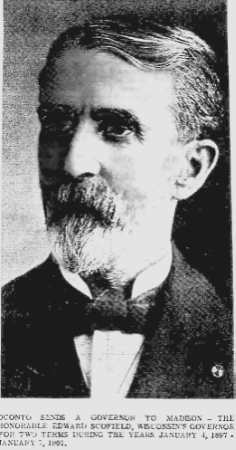
Researched, Written and Contributed by Ron Renquin
 |
EDWARD SCOFIELD
1842 - 1925
CIVIL WAR VETERAN
LUMBERMAN
SENATOR
GOVERNOR OF WISCONSIN
Oconto County has a history rich in Civil War Veterans, Lumberman, and a few senators. But only once has it sent one of her own to the Governors Mansion in Madison. Major Edward Scofield was elected twice to the position of Governor. In 1896 Major Scofield as a Republican defeated Willis Chisholm Silverthorn a Democrat, Joshua H. Berkey of the Prohibition Party, Christ Tuttrop of the Socialist Labor Party, and Robert Henderson of the National Party. In 1898 he went on to again defeat challengers Hiram Wilson Sawyer a Democrat, Albinus A. Worsley of the Peoples Party, Eugene W. Chafin of the Prohibition Party, Howard Tuttle of the Social Democratic Party and Henry Riese of the Socialist Labor Party.
A man of quiet dignitary, he left a mark
on a county that he called home for 57 years. He left his stamp on
the business sector and economy of this county and his political mark on
the history of the state of Wisconsin. The granite marker in the
Evergreen Cemetery bears final tribute to a man and an era. What
follows below is a collection of excepts and articles from the Oconto County
Reporter, and the Commemorative Biographical Record of the West Shore of
Green Bay, as well as photos and graphics. Edward Scofield,
hero, entrepreneur and statesmen.
OCONTO COUNTY REPORTER
July 16, 1881
Mrs. Maj. Scofield has gone to Know, Penn., where she will spend the remainder of the summer with friends and relatives. We hope that she will have a good time and return in safety to her home in the fall.
***
Oconto County Reporter
Feb. 2, 1889
DIED.
***
Oconto County Reporter
October 1. 1897
Madison, Sept. 29, -
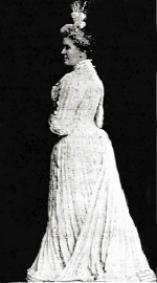
Jane Collison Scofield in her gown for the Governor's Inaugural Ball |
***
Oconto County Reporter
September 21, 1900
***
Oconto County Reporter
November 2, 1900
***
Oconto County Reporter
Nov. 20, 1891
***
Oconto County Reporter Nov. 11, 1971
Contributed by Dave Cisler Transcribed by Diane Horn
A page in Oconto County history 1900-1909
A New Century – A New Chance at Greatness
Although Scofield’s name was prominently discussed as a vice presidential candidate in the 1904 elections, his return to Oconto marked the end of his political career, and also his gradual retirement from the lumbering business. His mill at Superior burned in the spring of 1903, a loss estimated at $75,000. At about the same time, something happened that almost made the ex-governor give up his ideas of retirement. As the story was told in a 1903 issue of the Reporter, Scofield’s son, George, had gone west for his health a few years previous, and while tramping around Idaho had come across a stand of pine that “set his blood tingling with visions of lumber.” George hurried back to Oconto to tell his father of his discover, but the ex-governor scoffed at his description of the stand of yellow pin, claiming he must be exaggerating. This made George mad and he immediately returned to Idaho where he hired a couple of men and went into the woods and cut a sample log, shipping it home to his dad. When the log arrived, Ex-Governor Scofield became so excited he hardly waited for his grip to be packed before he started out for Idaho. George met him at the station and together they took a tramp through George’s discovery that resulted in the ex-governor buying a ten square mile section. George wanted to erect a mill on the site then and there, but his father thought he was too old to become a pioneer lumberman again.
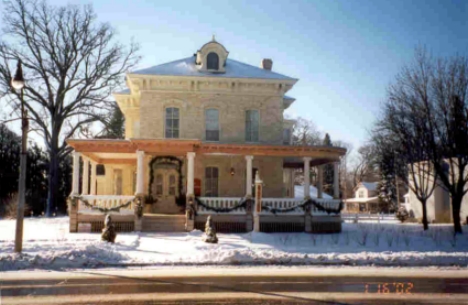 |
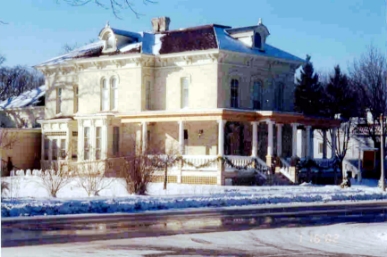
Scofield Mansion in the City of Oconto, Oconto County, Wisconsin |
From the Commemorative Biographical Record of the West Shore of Green Bay, Wisconsin, Including the Counties of Brown, Oconto, Marinette, and Florence. Chicago: J. J. Beers & Co. 1896
Page 474-75
Major Edward Scofield, whose name, in connection with the lumbering interests and progressive enterprises of northern Wisconsin, is “familiar as household words,” is a native of Pennsylvania, born March 28, 1842, at Clearfield, Clearfield county.
Isaac Scofield, his father, was a native of Virginia, descended of English colonists, and in early life moved to Clearfield Penn., where he combined the occupations of lumbering and farming. He married Miss Jane Collison, a lady of Pennsylvania birth, and nine children were born to them, five of whom are yet living; Julia, wife of J. R. Arnold, of Colorado Springs, Colo.; James, Henry C. and F. R., all three in Clearfield, Penn.; and Edward. The father died in 1873, the mother in 1885.
Our subject passed his boyhood days on his fathers farm, during the winter months, attending the district school, later taking a course at an academy at Clearfield. In 1855, at the age of thirteen, he entered the office of the Democrat newspaper, at Indiana, Indiana Co., Penn., in the capacity of printer’s “devil” and here not only learned the “art preservative of all arts,” but had ample opportunity of familiarizing himself with a considerable amount of general knowledge he failed to imbibe in his limited school experience. For three years he remained in the office of the Indiana Democrat, in return for his labor receiving his board and clothing. In 1858 he secured a position on the Jeffersonian, a journal published at Brookville, Penn., his salary being one hundred dollars per annum and his board.
On that paper he worked until April, 1861, when in response to President Lincoln’s call for 75,000 men he patriotically tendered his services for the preservation of the Union, and enlisted in the Eleventh Regiment Pennsylvania Reserves, which at that time was encamped at Pittsburgh. As soon as the battle of Bull Run was fought the regiment was ordered to Washington, arriving in time to assist in checking the advance of the Confederates on the capital. Here the members of the Eleventh P.R. were sworn into service for three years, or during the war, immediately becoming a part of the army of the Potomac, and young Scofield participated in all the engagements of that army up to and including the battle of the Wilderness. The same traits of character that have made Mr. Scofield a successful man of business were displayed in him as a private in the ranks, and he soon earned and received promotion. After the battle of Fredericksburg he was promoted to first lieutenant; upon the field of Gettysburg he distinguished himself, and shortly thereafter was commissioned captain of Company K, Eleventh P. R. “for meritorious conduct upon the field.” At the battle of Wilderness, May 5, 1864, within a few days of the expiration of his term of enlistment, he was captured by the enemy, and was held prisoner of war some ten months, during which time he was incarcerated in twelve prisons, to wit: Lynchburg, Danville, Goldsboro, Columbia, Andersonville, Macon, Savannah, Charleston, then back to Columbia and Goldsboro, thence to Raleigh, whence he was paroled and liberated March 5, 1865, about nine miles north of Wilmington, N.C., a few days after the capture of that city by Gen. Schofield. During his ten months prison experience Major Schooled suffered terribly, and his life toward the last hung almost on a thread, for when paroled he resembled a parchment-bound skeleton more than a living being. In Willmington he joined Gen. Schooled, and was at once sent to hospital at Annapolis, Md., where he remained until sufficiently recuperated to return to his home, at Brookville, Penn. On his arrival there he was pleasantly surprised by being handed a commission from the government promoting him to the rank of major “for gallant conduct at the battle of Wilderness.”
The close of the war found Major Scofield a young man of twenty three summers, and, through his ability and worth, risen to the rank of major. After his return to Clearfield he re-enlisted, in response to the last call, reporting for duty, but the regiment was not called into further active service. Truly his army record is one of which he may be, and is justly proud. On resuming the vocations of peace, he first engaged himself as an assistant to a corps of civil engineers, who were surveying for the low grade division of the Allegheny Valley railroad between Pittsburg and Driftwood, Penn., and after remaining with them in various capacities - from chain-man to transit-man - for a couple of years, he came west, in the fall of 1868, to Chicago. There he formed the acquaintance of Finn Hall, who had lumber interests in Oconto, Wis., and accepted the position of foreman in his mill there, in which capacity he continued to act for eight years, during which time he mastered all the details of the lumber manufacturing business. Industrious, shrewd and economical, he saved enough of his earnings to enable him to commence business on his own account, and leasing a mill on contract at Oconto, he operated it from 1876 to 1881.
Major Scofield first came to Marinette as superintendent of the lumber business of William McCartney, which industry after two years was incorporated under the name of the Marinetted Sawmill Co. In 1890 he and George R. Arnold formed a partnership under the firm name of Edward Scofield & Co., which business was, in 1894, incorporated as the Scofield & Arnold Lumber Co., of Marinette, with Major Scofield as President; George I. Scofield (his son), as vice-president; and George R. Arnold, as secretary and treasurer. The mills furnish employment to about 140 men and, and manufacture from twenty-five million to thirty million feet of finished lumber annually. The major is also interested in the lumber firm of McElwer & Co.., and having been connected with the lumber business from his youth, he is one of the best informed men on all matters pertaining to that industry anywhere.
In Oconto, Wis., in 1870, Major Scofield was married to Miss Anges Potter, a native of Pennsylvania, daughter of John Potter, who died in Clarion county, Penn., some years ago. To this union have been born three children, George I., vice president of the Scofield and Arnold Lumber Co., married and residing in Oconto; Paul D., a student at Amherst College; and Julia A.., who died at the age of five years. Mrs. Scofield is a member of the Presbyterian Church of Oconto
Politically, the Major is a staunch adherent of the
Republican party, and a zealous advocate of the principles embodied in
its platform. He has never sought political preferment, nevertheless
in 1887 he was elected to the State Senate from the First District of Wisconsin,
serving in that incumbency from 1888 to 1892. In 1894 he was the
choice of a great many Republicans for the position of governor, another
evidence of his popularity as a man of executive ability. For several
years he was a member of the board of supervisors of Oconto, in that as
in all capacities proving himself to be a hard and honest worker for the
good of his city, county, and State. Socially he is affiliated with
E. A. Ramsey Post, G.A.R., at Oconto, and of Wisconsin Commandery of the
military order, Loyal Legion. In business matters he is a man of
sound judgment and unquestioned integrity, and in the discharge of his
duties of citizenship he has been as prompt and true as when he followed
the old flag on Southern battlefields, while private and public life are
alike above reproach.
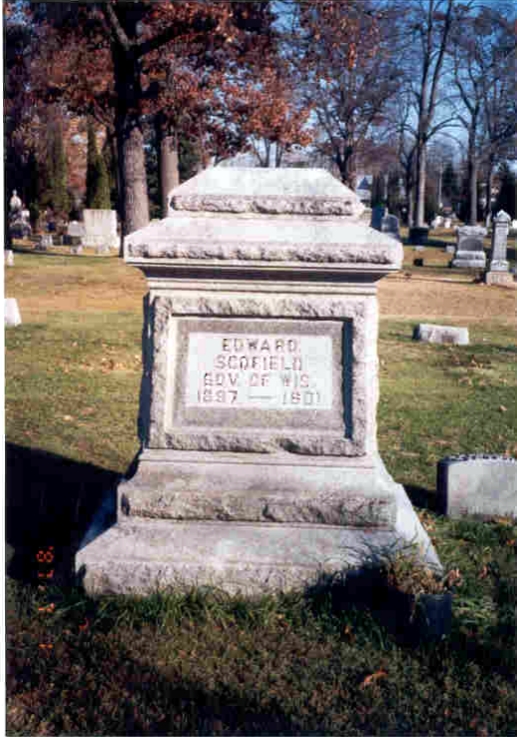
Edward Scofield 1842 - 1925 Civil War Officer & Veteran Lumberman Senator Resident of Oconto County Governor of Wisconsin 1897 - 1901 |
Death Ends Career of Former Gov. Scofield Here Tuesday
_______________
Prominent Citizen Dies at Age of Eighty-three From Weakness Due to
Old Age -
Prominent Figure in State
______________
The Career of Oconto’s most distinguished citizen
came to a close Tuesday when Edward Scofield, twice Governor of Wisconsin,
prominent lumberman, an well known figure in the political and business
life of the state died at this home here at 11:45 in the morning Typical
of his entire life and character were the words he uttered shortly before
death: “Have I a fighting chance? If I have I will go after it.”
Then slowly his strength ebbed, and he passed quietly and courageously.
For some time, he has been very feeble physically, but his fighting spirit
kept him up until about a week ago. Then his son, George was summoned
home from Milwaukee an it was learned that he was gradually growing weaker.
Daily his many friends and admirers in the city called at the Scofield
home to inquire as to his health and a few days ago he rallied slightly.
Anxiously the citizens of Oconto hoped against fear for his recovery but
he began to grow weaker, and it finally became known that the day of the
end was merely a matter of time. His attending physician, Dr. Minnie M.
Hopkins, said that death was incident to old age. The time for the funeral
has been set for Friday afternoon to give his grandson, Edward, time to
arrive here from Spokane, Washington. Services will be held from
his late home at 2:30 o'clock in the afternoon, Reverend Garrison to officiate.
Interment will be made in the family lot at Evergreen Cemetery, where Mrs.
Scofield is now resting. Deceased is survived by one son, George, one grandson,
Edward Scofield, of Spokane, Wash., and one granddaughter, Marian, Oconto.
Eventful Life The life of the former governor is a story of heroic struggles
in the face of few opportunities and bitter antagonism. His service
to his country during the civil war, his service to Wisconsin as one as
one of its ablest executives, and his rise to distinction in the face of
few opportunities should be a source of inspiration to every young man
of the city. He was born in Clearfield County, Pennsylvania, on March 28,
1842. After a few years study in common school and Clearfield Academy,
he started out at the age of thirteen to shift for himself through life.
He first worked as a printers devil in a Pennsylvania printing office,
and then though still a boy of nineteen answered his country’s call when
the cry to arms rang through the nation with the opening of the civil war.
He enlisted with Company K of the 11th Pennsylvania reserves, and the three
eventful years that followed brought glory, renown, and untold hardship
for the courageous youth. He participated in every battle fought
with the Army of the Potomac during the first three years, suffered for
ten months in Southern prison camps, and when the war closed had raised
himself from the position of private soldier to Brevette Major. His first
promotion to the office of Lieutenant came as a result of exceptional heroism
at the battle of Fredricksburg. Heroism at Fredricksburg The story is told
that the confederates placed timed shells before their outworks so as to
blow up when the union troops were charging into their earthworks.
The order to charge came at daylight. With a yell the troops under
the command of acting lieutenant Scofield dashed toward the enemy in the
face of a withering fire. When they arrived near the Confederate
earthworks, the timed bombs exploded tearing great gaps in the ranks.
But they forged ahead, climbing over the bodies of dead and dying comrades
until they were in the midst of the rebels earthworks. The story of this
period of the civil war is too well known to require repetition.
Desperate and bloody encounters followed fast upon each other. The fortunes
of the union armies ebbed. Then came Gettysburg. Here Lieutenant
Scofield again distinguished himself and in recognition of his service
was made captain. Then followed the desperate fighting of the Battle of
Wilderness which took the lives of two thirds of the members of the famous
Pennsylvania division in which Captain Scofield served. Here the forces
of the south executed a brilliant military maneuver and captured 2,500
union troops in a mass. Captain Scofield was among them and begining
at that time came the hardest period of the civil war for the youthful
officer. Imprisonment Conditions in the southern stockades were intolerable.
Once Captain Scofield escaped for a short time, hid in swamps and woods,
lived on what negroes were able to smuggle to him. But he was recaptured
and thrown into a dungeon as punishment. He was transferred from camp to
camp. One period of his imprisionment was served in Andersonville
Prison, where the barbarous treatment accorded prisoners cannot be depicted
even in the imagination Shortly before the close of the war he was exchanged
with many other prisoners. The long period of exposure, hardship,
and starvation had left him thin, haggard, weighing only 96 pounds.
Be he wished to see the conflict through to the end and enlisted as a substitute
for a drafted man. Before he could again reach the front, however,
the war came to a close. He was appointed Brevette major at the time he
was mustered out, a title which citizens have respectfully applied to him
throughout his life. For a short time he engaged in surveying work near
his home in Pennsylvania, and then left and went to the home of a relative
in Illinois to identify himself with the life of the Midwest. Shortly
afterward he went to Chicago, wondering what to do and where to go.
Seated in the Tremont Hotel, Chicago, one evenign he overheard tow
men discussing the lumber business in Northern Wisconsin. He struck
up an acquaintance with a Finn Hall, who urged him to come to Oconto. At
Common Labor He arrived in this city at the age of twenty six in the year
1868, and secured work at common labor in the Hall saw mill. It was
not long, however, and he was put in charge of work outside the mill.
Later he was made foreman. He stayed at this work for several years. He
was married in 1870 to Miss Agnes Potter. Two sons and one daughter
were born to them, of whom George survives his death. He went into the
lumber business for himself in 1881, by buying a small saw mill located
near where the present Holt Lumber Company shingle mill now stands.
Shortly after this he went into partnership with T. W. Harvey in a venture
known as the Marinette Sawmill Company. A small mill was purchased
at DePere and the machinery and equipment moved to Marinette. Later he
bought out the Harvey interests and formed a company know at the Scofield,
Arnold Lumber company, with the headquarters of all operations for a great
many years, at first under his supervision, and later under the management
of his son, George Scofield. His political career began in 1886 when he
was elected state senator from this district. Four years later he
was again elected on the face of the returns, but a Democratic legislature
awarded the contested election to John Fetzer, democrat of Door County.
While in the legislature, he made an enviable record, and won for himself
a position of leadership in his party. In 1896 he was nominated for
Governor, and at the following election was victorious by the largest majority
ever rolled up in Wisconsin up to that time. Efficient Administration The
efficient businesslike methods he practiced during the years he was prominent
in the lumber industry were brought to the service of the state during
his tenure as governor. He was responsible for the first tax commission,
instituted many banking reforms, and strived for efficiency in every department
of the state. He was governor at the time of the outbreak of the Spanish
American War, and naturally his first thought was for the welfare of the
enlisted men and the country during its days of stress. His efficient
work in organizing the Wisconsin guard had been the subject of much favorable
comment. The following statement with reference to the success of his administration
at Madison is taken from the Milwaukee Sentinel: “The legislature of 1897,
working in cooperation with the governor, provided the state reformatory
at Green Bay and the board of control. The reformatory was intended
for the more youthful offenders to provide a place where they could not
be in contact with the older and more hardened violators of the law.
This legislature also elected John C. Spooner as United States senator.
Other accomplishments of the legislature under the administration of Gov.
Scofield were: Provided an increase in funds for normal schools. Prohibited
pool selling. Enlarged and equipped the state historical library. Regulated
casualty insurance corporations. Revised the state banking laws. Prohibited
sale of cigarettes to minors. Passed first corrupt practices act to govern
elections. Sent memorial to congress asking for strengthening of the national
credit. Much strife Those were turbulent days in the history of Wisconsin
politics. Governor Scofield was a leader of the conservative Republican
wing of the party, but his administration saw the rise of the LaFollette
progressive group. His administration was made the object of many
bitter attacks, some of which were felt to be in bad taste by his friends
and a large portion of the electorate of the state. In 1904 he was again
a candidate for the nomination before the Republican convention, but a
split in party ranks occurred at that time, and two conventions were held.
After a long fight, marred by much bitter partisanship, the campaign closed
with the election of Robert M. LaFollette as governor. Active in Business
Although he took a keen interest in Wisconsin politics from that time forth,
he again directed his activities toward the lumber industry following the
close of his second term as governor. In 1899 the Scofield Arnold Lumber
company purchased a mill at Superior which was operated under the active
management of George Scofield. Then the mill burned, and operations
in that section were never resumed. At the same time he became interested
in timber in the West and purchased a tract of Idaho pine amounting to
about 400,000,000 feet. This tract was never developed because it
was located at a considerable distance from any railroad. In 1911
a fire swept through that area destroying a large part of this holding.
A considerable amount of this timber is still available for development
however. He also took over a holding in a large tract of timber in British
Columbia, Canada, and for several years has served as President of the
North Fork Lumber company and as Director of the American Timber Holding
company. His long experience in the lumber industry enabled him to serve
both of these companies in an advisory capacity. He made his business
headquarters in Milwaukee, where as a guest at the Hotel Pfister he become
one of the well known figures of that city. He was regarded as one
of the few remaining pioneers in the lumber business of this country, and
numbered among his friends and acquaintances prominent men engaged in lumbering
throughout North America. Glowing tributes have been paid to his memory
by leaders in the political and business life of the state. Men whose
names are bywords in the public life of Wisconsin expressed great sorrow
at his death in the Milwaukee Papers. With one accord they declared him
a gentleman of the highest type and patriot who thought first of public
service both in times of war and in times of peace.
~~~~~~~~~~~~~~~~~~~~~~~~~~~~~~~~~~~~~~~~~~~~~~~~~~~~~~~~~~~~~~~~~~~~~~~~~
BACK TO
THE OCONTO COUNTY HOME PAGE